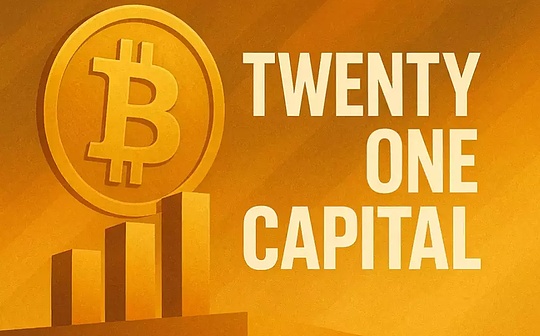Jessy,
Recently, Twenty One Capital, a company focusing on investing in Bitcoin, has been announced to be established. It is worth noting that the majority stake in the company will be held by Tether and Bitfinex, the world's largest stablecoin issuers, while SoftBank also holds a minority stake in the company. Currently, the company has also completed its listing through Cantor Equity Partners as a special purpose acquisition company.
Twenty One Capital is expected to start with holdings of more than 42,000 bitcoins, making it the third largest listed company in the world to hold Bitcoin reserves so far.
How to become the third largest listed company in Bitcoin?
According to the company's statement on April 23, the company's three major shareholders will invest a large amount of Bitcoin or funds to purchase Bitcoin. Tether will provide $2 billion in Bitcoin investment, while exchanges Bitfinex and SoftBank Group, which have the same parent company, will invest $600 million and $900 million in Bitcoin respectively.
Under the agreement with Cantor Equity Partners, the transaction between the two involves convertible notes private placement (convertible notes issuance) and equity private placement (equity PIPE issuance), with a total financing of US$585 million, including US$385 million convertible debt and US$200 million equity. Some of these financings will also be used for the purchase of Bitcoin. Once the agreement is reached, Twenty One Capital will trade on the Nasdaq under XXI as the stock code.
Based on estimates of these startup capital investments, Twenty One Capital is expected to start with holdings of more than 42,000 bitcoins, which will make it the third largest listed company in the world to hold Bitcoin reserves so far. The first two are MicroStrategy and Marathon Digital Holdings.
The biggest difference from the first two is that MicroStrategy is a software company, and buying is only an asset reserve for the company, while Marathon Digital Holdings is a Bitcoin mining company. Twenty One Capital has already clarified its positioning since its inception - focusing on investing in Bitcoin, and adding to the construction of some native Bitcoin products and services.
According to its announced three-stage plan, we can see that in the first phase of the company's development, it will focus on purchasing the accumulated amount of Bitcoin. In the second stage, we will focus on the popularization of Bitcoin-related knowledge and provide educational content and video media. In the third stage of development, it will star in helping Bitcoin-related financial and consulting services, such as providing Bitcoin-related debt and equity structured products. It can be seen that in the future, Bitcoin debt and equity products, consulting services, lending platforms and education platforms will all be the key product directions of the platform.
Judging from the company's development plan, what hits the point is the various needs that Bitcoin is gradually integrating into the mainstream environment. The ultimate goal is to build a Bitcoin-related service and financial company, so that more individuals and institutions can access Bitcoin-related financial products.
Jack Mallers, the company's CEO and founder of Strike, described Twenty One Capital as follows: "Our mission is simple: to be the most successful company in the Bitcoin space and to be the most valuable financial opportunity of our time. We are not trying to defeat the market, but to create a new market."
Do you have greater ambitions to challenge micro strategies?
It is worth noting that the micro-strategy's issuance of convertible bonds to purchase Bitcoin has set off a wave of imitation among many companies in this cycle. At present, it has become the number one listed company in Bitcoin holdings, and the second place is Marathon Digital Holdings, a mining company. Part of the Bitcoin he has obtained from mining, and the other part is raised by issuing convertible bonds, just like Micro Strategy.
Twenty One Capital wants to replace micro-strategy and become a "higher tool for investors seeking capital-efficient Bitcoin investment."
According to the company's disclosure, investors have the opportunity to purchase equity at a price of about 1 times the value of Bitcoin's net assets, which has an advantage over other companies that adopt Bitcoin funding strategies. And the company was founded to accumulate Bitcoin and increase ownership per share, not just track it.
To this end, Twenty One Capital has introduced two key metrics to reflect its Bitcoin-denominated capital structure and its Bitcoin-centric mindset. The first indicator is Bitcoin per share (BPS), which is the amount of Bitcoin represented by each fully diluted stock, reflecting the Bitcoin held by shareholders rather than fiat earnings per share. The second indicator is Bitcoin Return Rate (BRR), the rate at which BPS grows over time, which will measure the performance of a company in units of Bitcoin.
At present, it has accumulated a large amount of Bitcoin through its investment and financing from its partners. According to the documents submitted to the SEC, Twenty One Capital plans to raise funds for Bitcoin purchases and other operating expenses by issuing debt or equity securities. As companies conduct Bitcoin-related financial businesses, such as Bitcoin-related lending, providing Bitcoin-related debt and equity structured products, the income generated may also be used to purchase Bitcoin.
Another thing worth paying attention to is the company's background.
First, Cantor, which is a special purpose acquisition company, has a deeper U.S. government background. The company's former CEO Howard Lutnick was appointed Secretary of Commerce of the Trump administration in February 2025. Howard Lutnick's son Brandon Lutnick was appointed chairman of Cantor and became the main promoter of the acquisition.
TEDA and SoftBank are both companies with very important positions in the development of global finance.
SoftBank is one of the world's largest venture capital funds, managing huge amounts of funds and has a wide range of sources. Masayoshi Son is the founder and largest individual shareholder of SoftBank, holding a considerable proportion of the company's shares. In terms of institutional investors, such as BlackRock, Prudential Financial Asset Management, Fidelity International and other internationally renowned investment institutions, as well as investment funds such as Pan Atlantic Investment Group, Anhong Capital, AlfaWestone Investment, as well as venture capital companies and professional investment institutions such as Kaizi Capital, Sequoia Capital, and Gaorong Capital, all provide funds for them by holding shares in SoftBank. In addition, sovereign wealth funds such as Canadian Pension Fund and Saudi Arabia Sovereign Fund or public authorities are also important shareholders of SoftBank, providing them with a large amount of funds. Technology companies such as Amazon, Google, Alibaba, etc. also hold stakes in SoftBank.
TEDA's status is self-evident in the crypto industry. The overlord of the US dollar stablecoin and its binding to Cantor has gradually deepened in recent years. Cantor holds convertible bonds issued by Tether and assists in managing Tether's US Treasury reserves of more than $80 billion.
The cooperation between these three institutions is a strong alliance, with a large amount of capital, the overlord of the US dollar stablecoin, and the background of the US government. It is conceivable that in the future, this company will inevitably have an important impact on the Bitcoin and even the crypto market itself. This also indicates that Bitcoin has become an increasingly powerful force in the mainstream financial system that cannot be underestimated.
















No comments yet